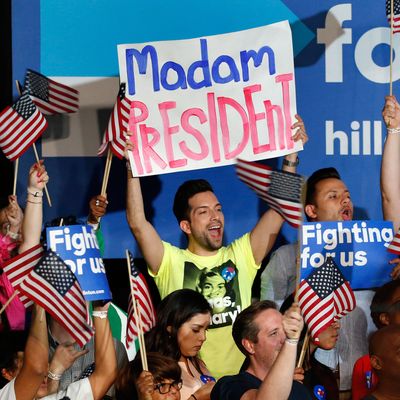
In the sort of quiet conversations political observers have on an ongoing basis, there is a bit of a jarring note you hear among progressives looking back at 2016 and forward to 2020: a concern that perhaps Americans still aren’t ready for a woman to serve as president. This represents both a rueful retrospective look back at the various reasons Hillary Clinton lost, and a fearful calculation of the odds that this or that kind of candidate can topple Donald Trump. These concerns are by no means limited to men, or to those championing any particular ideology. I’ve heard them from serious feminists who want to break that last glass ceiling with every fiber of their being, but who consider the defeat of Trump a patriotic duty and an ontological necessity, given the threat he poses to everything they care about most.
There’s now some empirical data to support the idea that left-of-center Americans, and particularly women, fear voter sexism. A massive new Pew study of “the state of gender and leadership and obstacles for women” asked if “Americans not being ready to elect a woman to higher office is a major reason why there are fewer women and men in these positions.” The gender breakdown in answers to this question is revealing, as is the trend since Hillary Clinton’s 2016 campaign:
Some 45% of Americans say that voters not being ready to elect a woman to higher office is a major barrier to female political leadership, up from 37% in 2014.
This change has come almost entirely among women. Now, 57% of women say this is a major reason why there are fewer women than men in high political offices; four years ago, about four-in-ten women (41%) said the same. Among men, the share citing voters not being ready to elect women to higher office as a major reason is virtually unchanged from four years ago (32% now and 31% in 2014).
The gender polarization over this question is enhanced when party affiliation is taken into account. Sixty-one percent of Democratic women appear to worry a lot about voter sexism (as compared to 46 percent of Democratic men), while only 18 percent of Republican men (as compared to half of Republican women) share this concern. The questions don’t identify specific “higher offices,” but obviously sexist voters are going to be most discriminating (in both senses of the word) about the presidency.
Now one can harbor fears about voter sexism without succumbing to them; it’s entirely possible to perceive a candidate’s gender as a political problem while vowing to challenge and overcome the resistance to a woman as president. But this is an issue that Democratic women (such as Elizabeth Warren, Kamala Harris, and Kirsten Gillibrand) considering a 2020 run–and their supporters — should confront openly. Personally, all things being equal, I think it makes more sense for Democrats to prefer a woman as a 2020 nominee, if only because (as we have learned again with Brett Kavanaugh, and before that with Al Franken) any man is going to be potentially vulnerable to a #MeToo revelation that in the heat of a presidential campaign with hundreds of millions of dollars available for opposition research could be devastating, or at least neutralize Trump’s own misogyny as an issue. And if a woman does defeat the 45th president, the victory would be all the sweeter for Democrats knowing that Republicans might fear in the future to accept such any more such retrograde, porcine leadership.
More immediately, a victory in the upcoming midterms, in which a pro-Democratic gender gap among women and a record number of women running as Democratic candidates are key factors, could well convince Democratic women and men that a “frontlash” from voters ready for a woman as president will dwarf any sexist “backlash” from those who aren’t. Regardless of party or gender, all feminists should have reason to welcome that development. Of all the indignities Donald Trump has imposed on Democrats since he decided to run for president, the fact that he has convinced many of them they dare not nominate a woman to oppose him is among the worst.






























